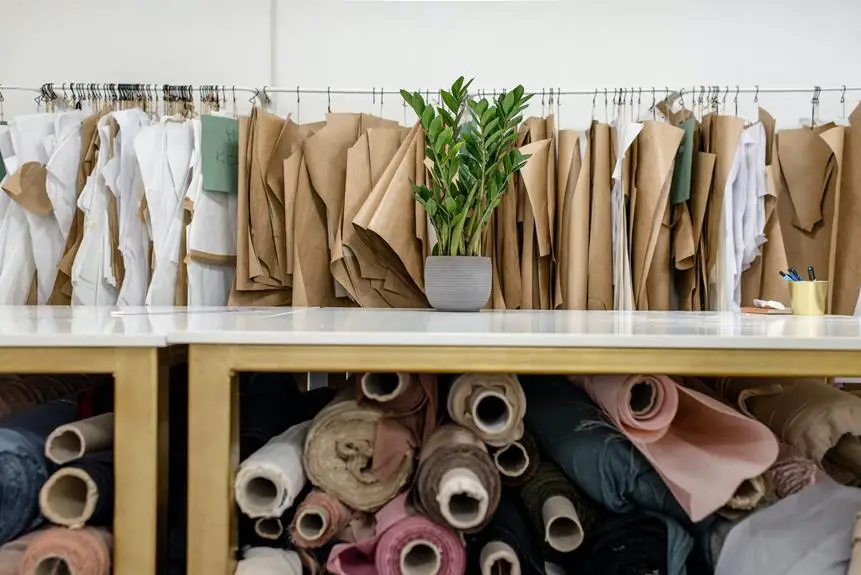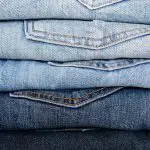Wondering whether viscose fabric lives up to its lavish reputation?
Viscose, a versatile and vivacious fabric, has garnered attention for its luxurious feel and drape. Its captivating characteristics, including breathability and absorbency, make it a favored choice in the fashion industry. However, the environmental impact of viscose production has sparked debate among discerning consumers.
As you delve into the intricate world of fabrics, you'll find that the hype surrounding viscose is both warranted and contentious. With its lush texture and captivating sheen, the allure of viscose fabric is undeniable. Yet, the discerning consumer must weigh its benefits against environmental concerns and production processes.
So, is viscose fabric truly worth the hype? Let's embark on a journey of discovery to unravel the truth.
Key Takeaways
- Viscose fabric offers softness comparable to silk and has a beautiful drape and elegant sheen.
- It is breathable and suitable for warm weather clothing, making it a popular choice for summer clothing.
- Viscose is versatile and can be adapted to various fashion styles, adding a high-end look and feel to garments.
- However, it is less durable than some other fabrics and its moisture absorption can affect its appearance and longevity. Additionally, there are environmental implications in its production process.
The Characteristics of Viscose Fabric
Viscose fabric offers a unique combination of fabric softness and moisture absorption, making it a popular choice for clothing and home textiles. The softness of viscose fabric is often compared to that of silk, providing a luxurious feel against the skin. This characteristic makes it an excellent choice for garments that require a delicate touch, such as blouses, dresses, and scarves.
Additionally, the moisture absorption properties of viscose fabric make it highly breathable, allowing air to circulate and moisture to be wicked away from the body. This makes it an ideal fabric for warm weather clothing, bed linens, and towels.
When it comes to clothing, the ability of viscose fabric to drape beautifully adds to its appeal. The fabric has a natural sheen that gives it an elegant look, making it suitable for both casual and formal wear.
In home textiles, viscose fabric's softness and moisture absorption make it a popular choice for bedding and upholstery. However, it's important to note that while viscose fabric offers exceptional softness and moisture absorption, it does require proper care to maintain its qualities over time.
The Environmental Impact of Viscose Production
Considering the demand for viscose fabric and its widespread use in clothing and home textiles, you might be interested in understanding the environmental impact of its production.
Viscose production has raised concerns due to its significant environmental impact. The process of creating viscose involves the use of wood pulp, which contributes to deforestation and habitat destruction. Additionally, the chemical processing of wood pulp into viscose involves the use of toxic chemicals and large amounts of water, leading to pollution of waterways and air. Furthermore, the disposal of these chemicals can be harmful to the environment if not managed properly.
However, the industry has been making efforts to address these concerns. Some manufacturers are implementing more sustainable production practices, such as using wood from certified and responsibly managed forests, as well as developing closed-loop production systems to minimize chemical waste and water usage.
Additionally, there are emerging sustainable alternatives to traditional viscose production, such as eco-friendly lyocell and modal fibers, which are produced using a closed-loop process and require less water and energy.
As consumer awareness of environmental issues grows, the demand for sustainable alternatives to traditional viscose production is likely to increase.
The Versatility of Viscose in Fashion
Exploring the diverse applications of viscose in fashion can reveal its versatility and appeal to a wide range of styles and preferences. Viscose fabric's versatility is truly remarkable, making it a popular choice in the fashion industry. Here are three key reasons why viscose is a go-to fabric for designers and fashion enthusiasts alike:
- Versatile Styles: Viscose fabric can effortlessly adapt to various fashion styles, from casual and bohemian to elegant and formal. Its ability to drape beautifully and take on different textures and finishes makes it a versatile choice for creating a wide range of clothing items, including flowy dresses, tailored suits, and comfortable loungewear.
- Breathable Comfort: The breathable nature of viscose fabric makes it a perfect option for clothing items. Whether it's a summer dress or a lightweight blouse, the fabric's breathability ensures comfort even in warm weather, making it a practical and fashionable choice for all seasons.
- Fashionable Appeal: Viscose fabric's luxurious appearance and soft, smooth feel give garments a high-end look and feel. Its natural sheen adds a touch of elegance to any outfit, making it a popular choice for both casual and formal wear.
Viscose's versatility in fashion, coupled with its breathable and comfortable qualities, makes it a fabric worth considering for anyone looking to enhance their wardrobe with stylish, functional pieces.
The Comparison of Viscose With Other Fabrics
When comparing fabrics, consider viscose's breathability, drape, and luxurious feel to make an informed choice for your fashion needs. Viscose is often compared to cotton and silk due to its similar properties. Here's a comparison of viscose with cotton and silk:
| Aspect | Viscose | Cotton |
|---|---|---|
| Breathability | Offers good breathability | Highly breathable |
| Drape | Falls beautifully | Can be stiff or crisp |
| Luxurious Feel | Smooth and silky | Soft and natural |
| Aspect | Viscose | Silk |
| Breathability | Offers good breathability | Highly breathable |
| Drape | Falls beautifully | Luxuriously fluid |
| Luxurious Feel | Smooth and silky | Ultra-luxurious |
Viscose shares breathability with cotton and silk, making it suitable for warm weather. Its drape is closer to silk, offering a luxurious flow. However, cotton and silk have unique textures and are often preferred for specific purposes. Understanding these differences will help you choose the right fabric for your fashion projects.
The Verdict: Is Viscose Fabric Worth It?
To determine if viscose fabric is worth it, evaluate its versatility, durability, and overall comfort for your clothing needs. When considering whether viscose fabric is worth investing in, it's important to weigh the pros and cons for a well-informed decision. Here are some key points to consider:
- Pros of Viscose Fabric:
- Versatility: Viscose fabric is highly versatile, making it suitable for a wide range of clothing items, from casual wear to formal attire.
- Comfort: It offers a soft and smooth texture, providing exceptional comfort, especially for sensitive skin.
- Breathability: Viscose fabric is breathable, making it ideal for warm weather clothing.
- Cons of Viscose Fabric:
- Durability: While viscose fabric is comfortable and versatile, it may not be as durable as some other fabrics, requiring delicate care to maintain its quality.
- Moisture Absorption: Viscose fabric has a tendency to absorb moisture, which can affect its appearance and longevity.
- Environmental Impact: The production of viscose fabric involves chemical processes that can have environmental implications.
When considering the best brands for viscose fabric, look for reputable manufacturers known for their high-quality materials and ethical production practices. Ultimately, whether viscose fabric is worth it depends on your specific clothing needs and priorities.
Frequently Asked Questions
Are There Any Specific Care Instructions for Maintaining Viscose Fabric?
To maintain viscose fabric, follow specific care instructions for best results. Proper moisture management and breathability are key. Handle with care to preserve its quality. It's worth the effort for a long-lasting, versatile fabric.
How Does Viscose Fabric Hold up in Different Climates and Weather Conditions?
In various climates, viscose fabric offers excellent breathability but may lack durability in wet conditions. Its environmental impact depends on the sourcing and manufacturing process, impacting its overall sustainability.
Can Viscose Fabric Be Used for Upholstery and Home Decor Purposes?
Viscose fabric is a versatile choice for upholstery and home decor. Its softness and sheen make it great for curtains and rugs. While it's not as durable or stain-resistant as some other fabrics, it can still be a stylish option.
Are There Any Potential Allergic Reactions or Skin Sensitivities Associated With Wearing Viscose Fabric?
Potential allergies or skin sensitivities to viscose fabric are uncommon, but its breathability and moisture-wicking properties make it suitable for sensitive skin. Its versatile nature and comfort level may outweigh potential concerns for most individuals.
What Are Some Common Misconceptions or Myths About Viscose Fabric That You Can Debunk?
Misconceptions about viscose fabric abound, but it's durable, easy to maintain, and offers decent weather resistance. It's great for home decor, yet some may have skin sensitivities. Learning the truth dispels myths.
- Tetron Fabric for Marine Applications: Durability and Use Cases - June 18, 2025
- Tetron Fabric for Outdoor Furniture: Weather Resistance and Care - June 18, 2025
- Tetron Fabric for Wall Coverings: Style and Application Tips - June 18, 2025




